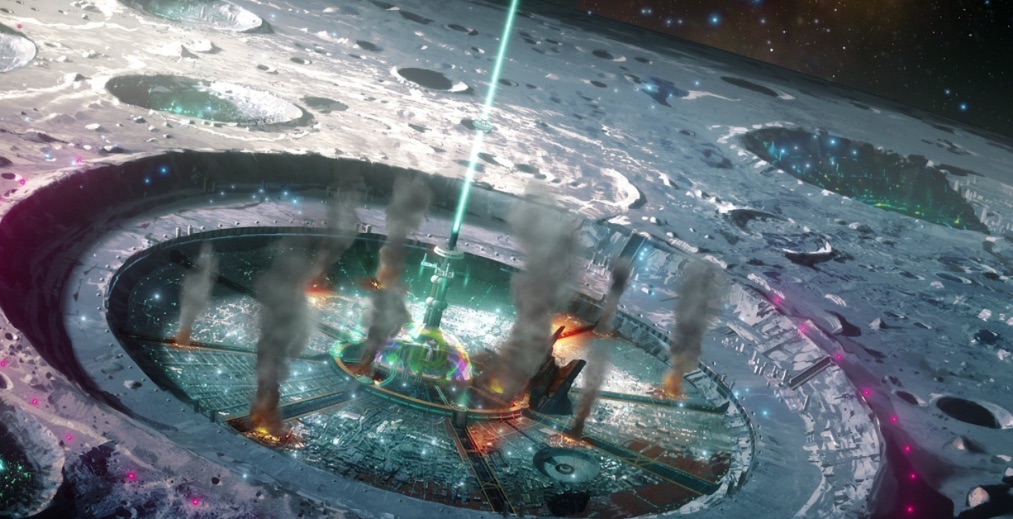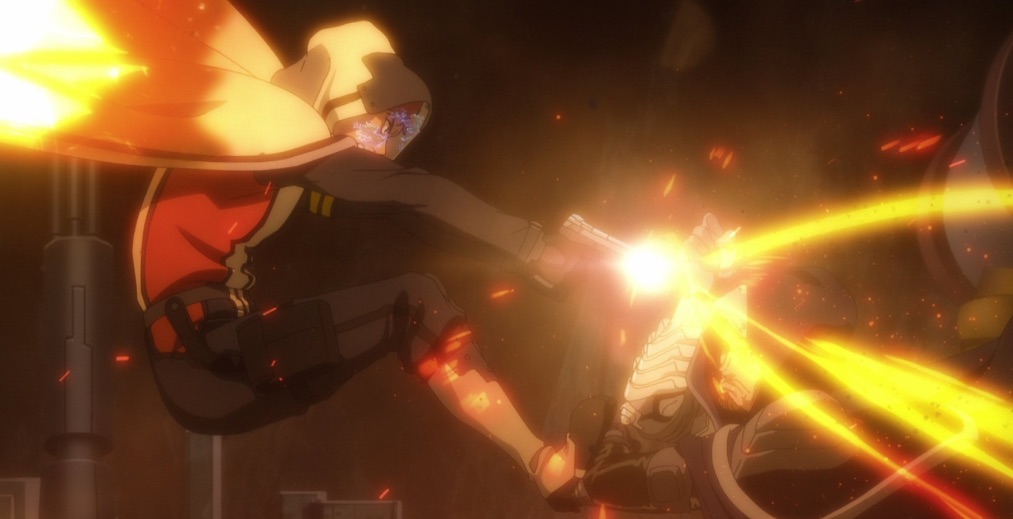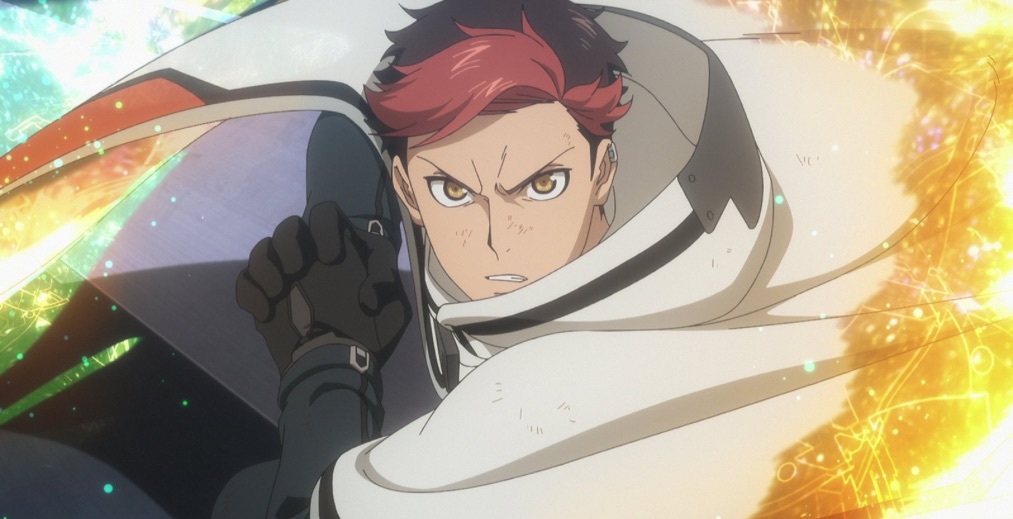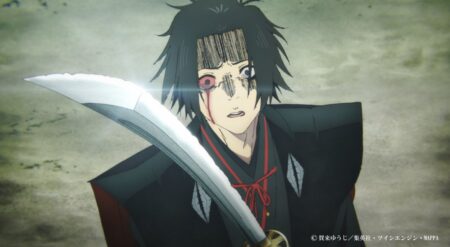Despite the established prestige talent involved, Moonrise (2025) is undoubtedly a befuddling experience overall. The series aims for space opera theatrics and character-driven drama amongst the stars, but it doesn’t stick the landing, too caught up in its ever-shifting lore. There’s too much going on with no easy answers. While the animation is flashy and engaging, and there are some characters and relationships we grow to care about, it’s not enough to carry an entire series.
Moonrise (2025) occurs in the not-too-distant future, where humanity has established a world government managed by an AI network, Sapientia. This idyllic, unquestioned life is set aflame, however, following a terrorist attack by the Moon’s rebel army. The rebel army, furious over the lunar development project that sends criminals to the Moon to maintain Earth’s peace, seeks independence to stop the disparity based on Earth’s actions. But while the uprising takes radical stances and eschews peace for the sake of violence, as the series progresses, we wonder if our protagonist, Jack Shadow (Chiaki Kobayashi), is on the right side and if all that is seen can or should be believed.
This type of political intrigue typically makes for thrilling adventures. And the bare bones of the story in Moonrise (2025) are interesting. Jack, who watches as his adopted parents die during the terrorist attack, is accused of working with the bombers. Due to this, he’s enlisted as a part of the VC3 Reconnaissance Assault Unit, a group from Earth who will infiltrate the Moon and kill a man called Bob Skylum (Masaki Aizawa), who dubs himself the Moon Devil. Jack’s ties to the Skylum and his mysterious childhood best friend, Phil Ash (Yūto Uemura), give the early episodes of Moonrise (2025) a necessary shove in the right direction.
However, it takes time for us to care for the rest of the VC3 crew, despite how early we meet them. This is partly due to the nonsensical way in which the series jumps around in terms of its narrative and timelines. The series opens with a fight on the moon before dragging us back in time to see how they got there in the first place. But there’s little explanation about this dystopian world or how society got to a place where AI was deemed suitable to run a government (an unfortunately timely series attribute).
Moonrise (2025) struggles to make us care about the larger cast.

This yo-yoing between storylines continues throughout the series. And while some series do well in refuting linear storytelling, Moonrise (2025) desperately needs it. Instead of showing how the VC3 crew bonds while training for their trip to the Moon, we watch them in action, leading up to a pivotal death before bouncing back in time. The emotional impact is severely lessened because of this, and it doesn’t drum up intrigue like it believes it does. It would have been twice as effective if we’d followed the characters from when they were forced to enlist until their deaths.
The same thing happens after the death of a Moon civilian whom Jack tries to save. Instead of showing us the outcome of the attack, we jump ahead. It’s an endlessly frustrating aspect of the series because any thematic tension is diffused. We need more time to sit in those moments and experience the grief and loss integral to the story. Because of all the warfare, the story is ultimately about connections and the bonds we make with those we fight with and for.
These narrative choices are the biggest detriment to a series with grand ideas but faulty cohesion. That said, it takes a while for us to care about any of the characters. The biggest pull is the relationship between Jack and Phil, in part due to their shared history and the wildly differing paths they take after they’re forcibly separated as children. However, the first shot of Phil finding Jack through a system glitch makes us care more about their dynamic than the others.
While Moonrise (2025) tries to push and make us care about the VC3 team, characters like Rhys (Misaki Yamada) and Georg (Katsunori Okai) don’t get enough time on their own to make an impression. It takes nine episodes for us to learn more about what is meant to be a central relationship.
The Netflix series shines in the animation.

It’s a lot of being told that the crew is a found family, and it’s not entirely earned. The late addition of the character Mary (Aina the End), a Moon civilian, helps push the story along. Her connections to Jack and Phil and her respect for Skylum give the series a refreshed energy. Mainly because it forces Jack to rethink all that he knows and how much he’s refused to question about his world and who, what, governs it.
Directed by Masashi Koizuka (whose work includes Attack on Titan and the upcoming One Piece remake) and based on the novel by Tow Ubukate, the series, at the very least, is astonishing to look at – a genuine visual spectacle. The backdrops, particularly, are stunning, with establishing shots that fully immerse us in this world. The animation team at Wit Studio creates intricate worlds and scenery, which allows the world to expand even as the writing stalls. Each episode possesses at least one jaw-dropping shot or sequence, especially once space-bound. There are no repeats as the series delivers vibrant landscapes and detailed structures, painstaking in their rendering.
The character designs from manga artist Hiromu Arakawa are strong and eclectic, though it’s mildly hilarious to see just how many face implants carry over from Fullmetal Alchemist. There are hints of Edward Elric, Winry, and Ling, depending on where you look. However, there are no carbon copies; instead, the style is a strong contrast to the science-fiction aesthetic.
Combat highlights the animator’s skills and eye for detail.

Moonrise (2025) also excels in action, even if we don’t always get an explanation of how things work. However, the combat is graceful and fluid, and it understands physicality, which makes the athleticism of the characters shine through. The direction moves well with the characters, keeping us engaged and focused on how the characters get from point A to point B. There’s weight to the movement, which makes each battle more intense because we feel the blows being dealt as characters fight for their lives and for the revenge they believe they seek.
Ultimately, Moonrise (2025) is so frustrating because its ambition is evident. It swings big and leans into heady science fiction and sweeping operatic narratives, and that’s necessary in fiction. I’d rather have a big swing and a miss than another series playing it safe with one-note animation. But it gets lost in its mechanics. It needed a tighter, leaner script and cohesive pacing that better establishes the sprawling ensemble and their relationships to one another.
I want to like it! But it drags its feet in the middle, and even as we watch Jack and co. reconcile what he thought he knew with what they learn, it makes for an, at times, tedious watch. It’s a beautiful one, but the series can’t simply rest on being pretty. Moonrise (2025) lacks a necessary emotional core and struggles with writing and pacing. It shines in the evolving dynamic between Jack and Phil and the mystery surrounding the Sapientia. And it certainly picks up towards the end. But the rough patches hinder the overall effect.
Moonrise (2025) shines in the technical. It looks and sounds great with immersive scenery and visionary establishing shots. But it loses itself in poor, nonsensical plotting and weakly defined characters. The ambition is clear, but it can’t quite meet its set bar.
All 18 episodes of Moonrise (2025) are out now on Netflix.
Moonrise (2025)
-
Rating - 6.5/106.5/10
TL;DR
Moonrise (2025) shines in the technical. It looks and sounds great with immersive scenery and visionary establishing shots. But it loses itself in poor, nonsensical plotting and weakly defined characters. The ambition is clear, but it can’t quite meet its set bar.







